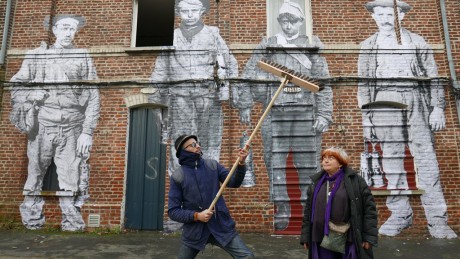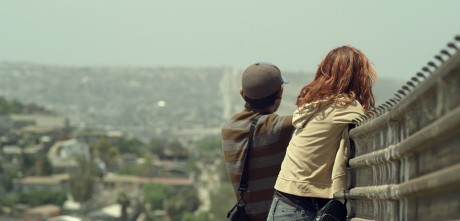PABLO IRABURU OG MIGUELTXO MOLINA: WALLS
The fall of the Berlin Wall in 1989 raised hopes of a world with no more concrete borders dividing populations. But today we see the exact opposite, and walls have been erected all over the world to set the boundaries between poverty and prosperity. On the U.S.-Mexican border, we meet a Vietnam vet placing crosses where Mexicans lost their lives trying to find a better life. On the other side, a Mexican couple is waiting for the right moment to attempt a climb over. A sentry patrols the banks of the Limpopo River along the border of Zimbabwe and South Africa, where many refugees drown trying to cross. At the Moroccan-Spanish border, we see a woman carrying huge packages on her back. The border scenes flow effortlessly into one another. Directors Pablo Iraburu and Migueltxo Molina add new meaning by placing the tableaux in split-screen compositions such as a Mexican tunnel placed beneath an African baobab. Meanwhile, a voice-over explaining the situation in Mexico accompanies scenes from the Moroccan border. The countless partitions all over the world form a universal problem. (Docs & Talks’ programme)
KOMMENTAR
Jeg har disse dage når jeg fulgte den flittige lancering af arrangementerne i Docs & Talks festivalen været så mærkelig optaget af dette still med de to unge ved hegnet, tænkt over det, hver gang jeg så det. Jeg havde ikke egentlig ondt af dem, for deres gensidige energi og målrettethed så jeg eller digtede jeg, var jeg i hvert fald sikker på. De forblev mine udtryksfulde og sikre helte.
Og nu har jeg så set filmen og forstået, at hver scene med de to netop er fyldt med deres kræfter og hengivenhed for hinanden. Og jeg skriver så nu en blogpost så godt jeg kan om Walls og om, at denne scene ved hegnet er selve sindbilledet på ømhed mellem de to, som hjælper hinanden. Han løfter hende op på sine skuldre, hvor hun balancerer ung og adræt og fuld af tillid, og så er de dobbelt så høje og erfarne. På en måde hver for sig, da de begge nu ved, hvad hun ser fra den højde: kameraer og vagttårne, som de skal undgå, men også muligheder, som de kan slippe igennem, klatre over. Mulige gennemgange, som de kan undersøge nærmere.
Så meget kærlighed udtrykt ved at lave kaffe til sin kone, så meget kærlighed i taknemmeligheden, i at tage imod kaffen, som hun viser, som hendes udtryksfulde krop fortæller i hvert billede, i hver scene i de tos historie, som i afbrudte små kapitler fortælles gennem filmen. Historien om det unge pars rejse til muren er, som jeg nu ser det selve billedet på godhed. De to som hjælper hinanden og deres fortælling er en legende, ikke en middelalderlig om helgener, men en langt senere fra min barndom: ”Der venter dem en syvdobbelt død, tænkte palmen. Løverne vil sluge dem, slangerne stikke dem, tørsten fortære dem, sandstormen begrave dem, røverne ihjelslå dem, solstik opbrænde dem, angsten tilintetgøre dem.” (Selma Lagerlöf)
Sådanne brudstykker af handlinger gennemvæver filmens parallelle fortællelinjer, som i klippet fortsætter hinanden, kommenterer hinanden, belyser hinanden, vel i samme tid, men på forskellige steder, ja, i flere verdensdele, på begge sider af stedernes ufattelige, ja, jeg griber mig i at tro det da må være løgn, men nej, rent ud ufattelige grænsemure og pigtrådsspæringer. Og så forunderligt, på begge sider af grænserne alle stederne opfører virkeligheden dramaer om den brutale virkelighed belyst ved den medfølende ømhed. Blandt mennesker, som lever i den samme egn, men adskilt af fjerne magthaveres begrænsninger af deres liv.
Der instuderes en teaterforestilling under det solitære træ midt på savannen, stykket forbereder i humorens distance, i dilettantgenrens velkendthed voldtægten af kvinden, denne voksne handling, hvis gru ikke kan mimes foran børnene, der som tilskuere morer sig over de voksnes forestilling, som forekommer dem at være en leg. På den anden side af en befæstet grænse et andet sted i verden, men måske samme dag, vandrer to alvorlige hvide mænd oppe i årene. De stiller dunke med frisk vand ud i ørkenen, hvor ellers ingen palme ville bøje sig med saftige dadler til de rejsende på dødsens farlig færd. Et tredje sted står en veteran fra krigen i sit værksted og laver gravkors som kunstværker, som han bagefter placerer, hvor et menneske omkom under rejsen. Den venlige og ordentlige grænsebetjent et fjerde sted i verden har anholdt to migranter et forbudt sted, forklarer dem, at han ikke vil se dem der mere, men sender dem ikke videre i ørkenens visse død, sætter dem bag i sin pick-up og kører dem tilbage til beboet område.
Altså at spille dilettant under træet, at stille dunke med frisk vand ud i ørkenen, at være venlig og ordentlig, men fast i mælet som grænsebetjent, tableauer af grusomheden og godheden, begge til stede på begge sider af grænsen. Filmen har foræret mig en række billeder som prægnante altid vil dukke op når jeg læser om grænsemure og hegn. Jeg forstår det sådan, at migranterne må vælge de mest øde og ufarbare ruter til rejsen og der er det mere naturen end grænsevagterne, som er deres udfordring, naturen er uden nåde, den er den farligste for dem.
Iscenesættelsen og fotograferingen i disse skildringer, ja, vel især kameraarbejdet er aldeles flot og uden overdrivelser, men måske også uden egentlig kant, men uangribeligt konventionelt akademisk som det er nødvendigt for en så bred henvendelse til et stort internationalt publikum. Mange vil kunne lide det, fremhæve det, beundre det, og således hænger det nøje sammen med filmens sympatiske propaganda, som er forbilledlig som de medvirkendes handlinger, som kamerafolkene skildrer som ét stort moralsk sindbillede. Til eftertanke. Som en nutidens Legenda Auria. Til efterfølgelse.
TXALAPARTA
Tue Steen Müller skriver i dag denne vigtige kommentar og fine erindring på sin Facebookside: “I fell in love with these Basque filmmakers many years ago at the Magnificent7 festival in Belgrade 2008 and later in Damascus at the DoxBox – both places they showed ”Nomadak”, a music documentary with a global humanistic point of view. The film is about the music instrument from their country, the txalaparta, that they take around the world to create music with locals. In Belgrade we had a concert before the film, one of memorable moments in my documentary film life. Now their film film ”Walls” (”Muros”) is part of the Docs and Talks festival and will be shown in Copenhagen and Aarhus followed by a debate about the many borders we humans set up in the world. One of the creators behind the film pays hommage to the collaboration between the two companies, one situated in Pamplona, the other in San Sebastian: ”Making movies is like playing the txalaparta. It’s a dialogue, it’s a two-person thing. Arena and Txalap.art have created together for a long time. Listening to our txalaparta in the end credits reminds us that we still share the same passion for telling stories with a purpose…”
RESUMÉ / DEBAT
Walls er en visuelt stærk film, der zoomer ind på de mure, der skærer sig igennem landskabet rundt omkring i verden, og på nogle af de menneskeskæbner, der udfolder sig omkring dem. Filmen udforsker grænseovergangene mellem Mexico og USA, Marokko og Spanien samt Zimbabwe og Sydafrika ved at sidestille historierne om dem, der befinder sig på den ene side, og dem på den anden side.
Filmens klare budskab er, at mennesker uden for murene og dem indenfor har mere tilfælles, end de tror. I EU, Trumps USA, Afrika, Mellemøsten og Asien skyder flere og flere grænsemure og hegn op, selv om den politiske vision efter Berlinmurens fald var en verden med færre grænsehegn.
Hvordan er grænser i stigende grad blevet svaret på en global verdens problemer? Hvem tjener penge på dem? Hvad er konsekvensen globalt og i de lokale grænseområder? Efter filmen debatterer migrationsforskerne Ninna Nyberg Sørensen (DIIS), Gabriella Sanchez (EUI) og Martin Lemberg-Pedersen (AAU) implikationerne af den nye globale grænsevirkelighed. Debatten foregår på engelsk. (Docs & Talks’ program)
FRE 23/02 16:30 i Cinemateket i København og TIR 27/2 14:00 i Øst for Paradis i Aarhus / MIGRATION / WALLS / Muros / Pablo Iraburu, Migueltxo Molina, 2015 / eng. tekst / 132 min. inkl. debat. Her er program og billetbestilling:
http://www.dfi.dk/Filmhuset/Cinemateket/Billetter-og-program/Serie.aspx?serieID=15914 (Cinemateket)
http://paradisbio.dk/NextDaysProgramme.aspx?offset=0 (Øst for Paradis)
http://wallsmuros.com/en/credits/?aux=3 (producentens side, lange udførlige credits)




